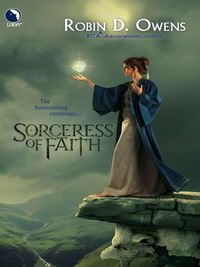
Полная версия
Echoes in the Dark

Praise for the novels of
ROBIN D. OWENS
“Strong characterization combined with deadly danger make this story vibrate with emotional resonance. Stay tuned as events accelerate toward the final battle.”
—Romantic Times BOOKreviews on Keepers of the Flame
(Book Four of The Summoning)
“Fans of Anne McCaffrey and Mercedes Lackey will appreciate the novel’s honorable protagonists and their lively animal companions.”
—Publishers Weekly on Protector of the Flight
(Book Three of The Summoning)
“[A] multi-faceted, fast-paced gem of a book.”
—The Best Reviews on Guardian of Honor
(Book One of The Summoning)
“The story line is action-packed but also contains terrific characters…Robin D. Owens enchants her readers.”
—Affaire de Coeur on Guardian of Honor
“Owens takes…elements that make Marion Zimmer Bradley’s Darkover stories popular…and turns out a romance that draws you in.”
—Locus magazine
“Owens excels at evocative, sensual writing.”
—Romantic Times BOOKreviews
Echoes In The Dark
Robin D. Owens

To the Song that moves within us all.
“Poets are the hierophants of an unapprehended inspiration; the mirrors of the gigantic shadows which futurity casts upon the present.”
—Percy Bysshe Shelley

Contents
Chapter 1
Chapter 2
Chapter 3
Chapter 4
Chapter 5
Chapter 6
Chapter 7
Chapter 8
Chapter 9
Chapter 10
Chapter 11
Chapter 12
Chapter 13
Chapter 14
Chapter 15
Chapter 16
Chapter 17
Chapter 18
Chapter 19
Chapter 20
Chapter 21
Chapter 22
Chapter 23
Chapter 24
Chapter 25
Chapter 26
Chapter 27
Chapter 28
Chapter 29
Chapter 30
Chapter 31
Chapter 32
Chapter 33
Chapter 34
Chapter 35
Chapter 36
Chapter 37
Chapter 38
Chapter 39
Chapter 40
Chapter 41
Chapter 42
Chapter 43
Chapter 44
Chapter 45
Chapter 46
Chapter 47
Author Note
Cast of Characters
1
Ghost Hill Theater, Denver, Colorado
Late August, Night
Jikata was taking her last bow on stage and soaking in applause when her great-grandmother died. The odd thing was that Jikata actually felt Ishi Yamuri pass away in one of those increasing moments of hyperawareness. As if the old woman touched Jikata with her stubborn disapproval even as others yelled and clapped.
The bond with her great-grandmother vanished. Ishi hadn’t waited to see Jikata tomorrow, the date Ishi herself had insisted upon.
Jikata had added her old hometown of Denver to her touring schedule because she’d sensed her great-grandmother’s time was near, though she hadn’t heard from the woman in years.
Suddenly the applause, the only thing that had satisfied Jikata for a long time, rang hollow and empty. Like the rest of her life.
Jikata lowered her head, closed her eyes against the lights made brighter by tears. Then she stepped back on the polished wooden stage and let the heavy maroon velvet curtains descend.
The crowd whistled and clapped louder, but she had no more to give. This final event—the reopening of a newly renovated small Victorian theater—was the last in her tour. Fitting.
Her career was skyrocketing. She neared the pinnacle of success for a pop singer, a female half-Japanese no less, and found herself alone and panting after the climb.
Her life was tanking. Fans adored her. No one loved her. No man, no good friend female or male, no child. As her great-grandmother would have said, her soul was withering from lack of nourishment.
Applause came from stage right and the philanthropist behind the renovation strode forward, beaming, accompanied by his wife. Jikata pasted a smile on her face, hoping that it might turn into the real thing since she usually enjoyed the company of Trenton Philbert III. He stopped clapping and held out a hand and she put hers in it. “Great job. Definitely the next star. I’m looking forward to that last zoom to the top.” He squeezed her hand and let it go.
The praise warmed her a little. “Thank you.”
“You did the inaugural event of the Ghost Hill Theater proud. Thanks again for agreeing to perform. We sold out.” He glanced around, the backstage was still shiny with cleanliness and held the faint scent of wood stain. “This place should be good for another hundred years.”
“It’s a lovely theater,” Jikata said. Now. She could remember when it had been a ruin.
He radiated satisfaction. Turning to his wife behind him, he said, “We have a gift for you. Darling?”
Juliet Philbert stepped forward with a large fancy birdcage fashioned like the Taj Mahal. Jikata gritted her teeth…no, please, not a bird. Her great-grandmother had kept finches when Jikata had been younger. “I’m sorry,” she said, “but I—”
Then the bird opened its beak and pure liquid notes warbled out, like nothing Jikata had ever heard. As if it were more than song, a communication. The bird didn’t look like any she’d seen before, either. All scarlet red, but with a fancy cockatoo comb of red, yellow and white. About the size of a cockatoo, also. It fixed a yellow eye on her and let loose another stream of notes. This time sounding a lot like the underlying melody of the last ballad she’d sung. Jikata blinked.
“Her name is Chasonette,” Juliet said. “She’s a Lladranan cockatoo and has the most beautiful birdsong in the world. She’s quite rare, but I knew such a lady would be perfect for you. And Trent indulged me.” She thrust the cage at Jikata, so she took it. It was lighter than she’d thought.
Juliet tucked her hand into Trenton’s elbow and he covered her fingers with his own, shaking his head as he looked down at his wife. “I always indulge you. The bane of my existence.” He kissed her temple. “People say I’m going soft.”
Fast footsteps came from backstage and Juliet’s assistant, Linda, who appeared distressed, hurried to them. Jikata remembered, and the small moment of normality shattered.
“I’m sorry.” Linda stopped, inhaled a breath that raised her thin chest. Looked at the Philberts, hesitated and said, “I’m sorry. I have bad news. We should…ah…let’s go to your dressing room.” Linda pulled Jikata backstage, past the greenroom and into the star’s dressing room. The Philberts followed.
The small room was elegant in cream and white, but four people made it crowded. Jikata placed the birdcage on the dressing room table. Chasonette stepped nervously back and forth on her perch, then apparently caught sight of herself in the mirror and preened.
Linda led Jikata to the cream brocade Victorian fainting couch that took up most of one end wall. She figured she had to sit. The moment she did, Linda released her hand—a blessing since both their palms were sweaty.
Linda grabbed a box of tissues from the dressing table and dropped it in her lap. “I got a call. Your great-grandmother has died, Jikata.”
“I was supposed to visit her tomorrow,” Jikata said, still shocked.
“Sorry,” repeated Linda. She was a young intern with the University of Southern California who’d traveled with Jikata during the two-month tour. Though they’d managed well enough, neither of them expected the job to transform into anything more.
“She was an old woman and had a good life.” Isn’t that what Jikata was supposed to say? “I want to be alone,” she choked out.
“Of course. We’ll take care of your crew and fans.” Juliet, patting Jikata on the shoulder, trilled her tongue. Chasonette perked up and warbled a low, soothing melody. “I’m sure you don’t want to attend the opening gala.”
“No, I don’t.” It had completely gone from her mind.
“We’ll make sure your room in the hotel next door is booked for you through the next week. It’s been a gruelling tour for you, I know. You need rest.”
“Yes, I’d planned a long break.” Rote answers seemed to work. Jikata didn’t know what she felt except…empty. Nothing new about that.
“You just go next door when you’re ready,” Juliet insisted.
“Fine.”
The bird continued to croon, soft background scales that tugged at Jikata, reminding her of the chants and chimes that had haunted her. She rubbed her temples.
Trenton squatted down, as if setting himself in her vision. “Jikata, if there’s anything we can do….”
She nodded. “You go on to the gala. You’re the star of that show.”
“All right, but if you need us here in Denver, let us know.”
She watched blindly as the Philberts left. They were the only people she felt she could call on in Denver, and they were acquaintances. All her old ties had withered.
“Um, Jikata?” Linda said.
Oh. The girl had looked forward to the end of the tour and the big party to celebrate the renovation of the theater. With another nod, another blank gaze, Jikata said, “You go ahead. You don’t have to stay with me the next couple of days. Let’s call this the end of the internship.”
“I don’t know, if you need me….” But Linda sounded relieved.
Jikata was prepared. She went to her designer backpack and got the card—with bonus—from an inner pocket. Held it out. “Thanks for all your help. I’ve already turned in my last report. You’re free to go.”
“Thanks!” With a smile showing the job was already history, Linda hurried from the room.
Jikata sat and listened as the theater emptied, then dragged herself into the shower. Let the heat and steam flow over her as she prodded her feelings about her Japanese great-grandmother. Regret, as always, they hadn’t ever seen eye-to-eye. Her great-grandmother had refused to speak to her after she’d legally changed her name to Jikata, had hated that she’d become a pop singer. At eighteen, Jikata had left the dust of Denver for L.A. and prospered.
Well enough that she could buy whatever she wanted, keep her great-grandmother in style. Which, of course, Ishi had refused, liking the little house in east Denver she’d bought a few years after leaving the internment camp in southeastern Colorado. Both of Jikata’s grandmothers had died before she was born. Both her grandfathers had been unknown, a bond between her parents who were killed in a car accident when she was fourteen.
Sad. Jikata felt it, mostly for the lost opportunity to reconcile, though she’d known in her bones that was wishful thinking.
Now she was truly alone. No more family.
She wondered what to do. Knowing Ishi, all her affairs would have been arranged. Jikata was ambivalent about seeing the old house. At the end of a tour, she usually found the nearest bed and fell into it. But lately her sleep had been troubled by dreams that had her sweating and tangled in sheets when she woke. Or, worse, visions that were pure beauty she strove to put into words and sing.
Those songs always bombed. She did much better when she sang others’ melodies and lyrics, and that was a raw spot in her soul.
The pipes creaked and water cooled and she turned the shower off. At least the makeup and sweat of the last show, of the tour, was finally gone.
Wrapping herself in a large towel, she stepped into the dressing room. The mirror was foggy with steam so she opened the door, dressed quickly in jeans and a blue silk blouse and packed a small suitcase, put her backpack in order and swung one strap over her shoulder.
She turned to do a sweep of the room and froze.
The birdcage door was wide open. Jikata blinked—could the bird have unlatched it herself? Apparently so. A very valuable, rare bird.
Her gaze trailed to the open door of the dressing room. Shit! She looked wildly around the room, but it was small and a foot-long scarlet bird was not evident against the cream-and-gold background.
Dammit!
She hadn’t seen or heard the wretched bird leave. No trilling of a goodbye song. No soft whoof of feathers.
Sliding her feet into ballet slippers, she opened the door wider, then heard a tinny chime. She glanced at the table where the chiming-ball necklace Juliet Philbert had given her when they’d met had been. Pretty and shiny on a gold satin ribbon, it was gone, too.
Jikata grimaced. She was ambivalent about chimes. She’d included them in her own compositions that hadn’t been successful, then the last one that had made it big. It was hitting the top of the charts now. The strange concoction of bells and chimes and an occasional gong tone. She’d sung—chanted—a mishmash of words in English and Japanese and French and had layered her voice in the track again and again over four octaves. She barely had a full four-octave range and had worked hard on that track until each note was strong and perfect.
“Come to Me” was going platinum.
The tune wasn’t really her composition and that’s what bothered her. She’d heard odd patterns of notes, of chimes, of chants, the occasional gong beat in her head over the past two years. It had started here in Denver, her hometown, two years ago February. A February as dreary as her life. Ishi hadn’t wanted to see her then, either.
She shook the thought away. Stop dithering! Go hunt the bird. She stepped to the door, called, “Chasonette!” Would a bird come to her name? Cockatoos were supposed to be intelligent for birds, weren’t they?
Another chime. Faint. But her hearing was good and she was sure it came from the stage area. She hurried past the greenroom, angling toward stage left, which had more space than stage right. A bird would want more space to fly in, wouldn’t it?
Only a few dim bulbs were on and she moved through light and shadow. She pushed through the curtains to look into the house—even dimmer—and saw a flash of a red wing through the door to the lobby someone had propped open with a broom.
Damn!
So she hopped from the stage and ran up the plush maroon aisle, through the door to the equally elaborate lobby.
Then she heard the wonderful song of a woman’s voice, with the slightest of quavers that made Jikata think the singer was old. An elder and perfect master of her craft. The wordless Song compelled Jikata to listen. Not to hear, but listen, and the mistress of that voice had the range of Jikata’s own, a full four octaves, richer for years of use.
Other music lilted. Crystal singing bowls, chimes, and the jangle of Chasonette’s ball melded perfectly into the whole.
“Chasonette?” she called.
Chasonette chirped. Jikata ran after her, misjudged the distance of the sound and went through the mirrored wall.
No!
That couldn’t have happened. Could it?
She stood in a gray mist. Wind whipped at her hair. There were no walls around her, just an echoing distance. Where was she? Her toes curled in her shoes, felt solid ground through the thin soles of her slippers. Shouldn’t it be new, plush carpet?
She hesitated, but more chimes and the voice and the bowls and the sheer magnificence of the sound drew her. How often did a person hear this sort of concert? Never.
There were cadences and tones to this Song that outclassed all her composition attempts. As if she’d…heard through a mirror darkly…. She chuckled, but she yearned. This, this was what she’d been trying to achieve for the past year. If only…
Another questioning chirp and Jikata realized she was humming her “Come to Me” hit. Light was ahead and walls looked cut from rock. That reassured her a little. Everyone knew there were tunnels under Denver. She’d somehow made it into one of them.
Then the woman’s voice twisted the melody and the notes seemed to hit physical points inside Jikata. She literally felt her heart squeeze. So wonderful, and there was more, she heard the reverberation of the chant she’d included in her own work. Come to me.
The woman’s voice caressed her with a soothing cadence. Jikata blinked, she saw the woman, a tiny, aged, Asian woman standing in light that reflected off mist around her, giving her a glow. Chasonette perched on her shoulder, the ribbon of the chiming ball in her beak. She shook it. The sound shivered over Jikata’s skin. She glimpsed people behind the woman, playing singing bowls.
Stranger and stranger, but not threatening.
Jikata hurried forward, met a thickness in the air like a membrane, surged through it. More wind. In a tunnel or dreaming. She could have fallen asleep on the Victorian fainting lounge in her dressing room after her shower. But she plunged ahead. Then she was with the woman, and Chasonette hopped from the woman’s shoulder to Jikata’s, dug in her claws. Ouch, she felt that!
“Welcome to Lladrana,” the older woman said in English. She gestured and cymbals clashed and chimes sounded and a shudder went through Jikata.
Brightness flared before her eyes, blinding her. She flung out her arms, trying to keep her balance. Another clang as if from a gong, but the percussion was slightly off and she knew it came from many cymbals. What the hell was going on?
A dream. Just a dream.
Hair had risen over her skin, and she’d gone clammy. The air she sucked in smelled like incense and was heavy and humid. She shook her head, trying to think beyond the sound.
She couldn’t.
The music strummed her as if she were a taut string, vibrating through her.
Another clang of cymbals and she fell, panting, to the floor. Starburst. Darkness. Then Chasonette was beside her on the ground, rubbing her head against Jikata’s cheek. So soft.
Jikata could see the bird’s yellow eye and thought she was finally back to reality. She leaned on an elbow, but her support didn’t feel like a padded lounge, or carpet. It felt like rock.
She looked around and saw a large cave, people wearing long robes standing in a circle. Some had small tables holding crystal bowls before them and held the thick glass wands to set them humming. Others held cymbals of brass, silver, gold…?
Her mouth was open so she sucked in deep breaths. The small woman gazed down at her with triumph, crinkling deep wrinkles around her eyes even as her throat moved with renewed song, music that lowered down the scale as if ending a long piece.
We are here! I am back! A warbling voice came in her head and Jikata slowly turned to see Chasonette. She could have sworn the bird winked at her. There’s magic here, the bird said.
Jikata sat up, craned to look around. Just beyond some people she saw the pale pink and deep maroon lobby of the Ghost Hill Theater amidst a blue fog in the distance. Strangled noises came from her throat as she jumped to her feet.
Then that glimpse of known vanished and she was in a cavern, large enough to hold the musicians surrounding her, all taller and sturdier than the old woman, than Jikata herself.
Chasonette fluttered to her shoulder. The bird’s fragrance was the same, as if her feathers held a faint lavender oil.
Once more the bird took wing, and the chiming necklace was dropped over Jikata’s head, rattling to shine silver against her dark blue blouse. Then Chasonette was on her shoulder again, yellow gaze serious. You are where you belong.
“I am the Singer,” the old woman said.
She certainly was.
“Now to test your tuning,” she continued. That didn’t make sense. But she opened her mouth and hit high C with ease. At the same time the cymbals clashed, someone rang chimes and the singing bowls sounded. Every note reverberated in Jikata until she felt like only pure vibration.
She crumpled. She didn’t understand anything.
2
Lladrana, Singer’s Abbey, a few minutes later
Luthan Vauxveau, the Singer’s representative to the warrior Marshalls, stood in the green landing field just downhill from the Singer’s Abbey. He’d been about to return to the Marshalls’ Castle, when he’d felt it, the Summoning of another Exotique from their land to Lladrana.
The soles of his feet had tingled with a joyous outpouring of Amee, the planet, that her last savior had arrived. His winged horse and the rest of the herd had trumpeted.
A shout tore from him, joining other exclamations.
Even as he felt the planet’s joy, his own anger welled and the back of his neck burned with humiliation. He hadn’t felt this stupid since before his father had died. The Singer had manipulated him, used him, played him for a fool. Again.
Soon the vibrations of the act would notify every person with a modicum of Power that a new Exotique had crossed the Dimensional Corridor and entered Lladrana. That would include the five other Exotiques who would demand immediate answers from him. All he had was questions himself.
People from Exotique Terre were supposed to be Summoned by the Marshalls, the strongest team in the land. But the Singer had Summoned her own. Luthan ground his teeth.
He was the representative of the Singer to the Marshalls and all the other segments of Lladranan society. He was supposed to know what she had planned, be informed. He was the one people would come to, ask questions of.
Especially the other five Exotiques.
He’d known nothing. The Singer had kept this Summoning, and other matters, secret from him. This was the last straw, and time to tell her so.
Simmering with anger, he turned back toward the central Abbey. He’d find her in the caverns, a place off-limits to him, but that wouldn’t stop him. Not now, not ever again.
He’d tried his best over the past two years to liaise with the Singer and the Marshalls, the Chevaliers, even the Sorcerers. And over the past two years the old Singer herself, the oracle of Lladrana, had become more secretive and capricious.
Striding to the high wall enclosing the Abbey’s jumbled buildings, he swung open the gate with Power, shaping a bubble around himself so he could not be detained. His force field gently shifted robed figures of the Singer’s Friends from his path as he wound through the buildings toward the towers of the main Abbey.
The Singer’s Friends reached out to pluck at his white leathers, stood in front of him, yet all were moved aside. He was a Chevalier, a fighter, had fought battles against the Dark and its monsters for most of his life. With respect, he’d bent his will under the Singer’s. No more. He could feel the location of the Singer and the new Exotique, could hear it.
A fifth-level Friend, the highest in the hierarchy, stepped in front of him just where the mazelike path narrowed to allow only one person. The man stood his ground, but Luthan’s Power pushed him and he had to back quickly. “Don’t get in my way, Jongler. I must speak to the Singer about her Summoning the last Exotique without telling anyone.”
The man stared at him from under lowered brows. He sighed. “It is done. The final Exotique is for the Singer. It is appropriate that our lady Summoned her instead of the Marshalls.”
Luthan continued walking. “Fine. You tell that to the other Exotiques when they swoop down on this place in a couple of hours.” He smiled. “I estimate that the Distance Magic of the volarans will bring them that quickly.” He hesitated a step. “Of course Bri has the roc, and roc Distance Magic is even faster.”
The man paled, the giant bird liked flesh. “Not the roc.”
Luthan let his sarcastic smile widen. “If you’re lucky, it will be Bri, the healer, riding the roc instead of Lady Knight Swordmarshall Alexa.”








